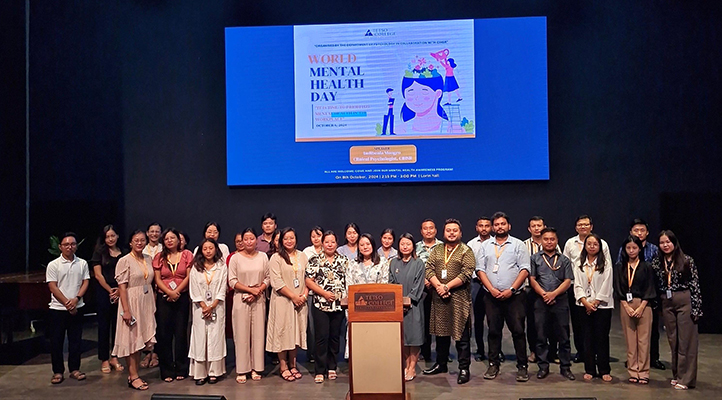The Department of Psychology at Tetso College commemorated World Mental Health Day through two events focusing on mental health in the workplace.
Community Outreach Programme (October 5th): At NIDCL Dimapur, Ms. Lamyile Meru, Assistant Professor of Psychology, addressed employees on “Building Wellness: Supporting Mental Health.” She emphasized how workplaces should promote meaning and purpose rather than stress and burnout. Key strategies discussed included leadership engagement, workload management, clear boundaries, and comprehensive leave policies. The presentation highlighted how workplace stress results in substantial financial losses for organisations through absenteeism and reduced productivity. As modern workplaces evolve,
investing in employee mental well-being has become essential for both human welfare and organisational success.
Campus Workshop (October 8th): Mrs. Imlibenla Mongro, Clinical Psychologist at CIHSR, conducted a workshop for faculty and staff, focusing on stress response patterns:
● Fight Mode: Characterised by hyperarousal and anxiety
● Flight Mode: Leading to social withdrawal
● Freeze Response: Resulting in emotional paralysis.
She introduced practical stress management techniques, including situation assessment and task prioritization through numerical structuring. To combat stress, the speaker suggested that individuals should assess and categorize situations, distinguishing between real threats andmisplaced stress. This involves evaluating circumstances and avoiding the tendency to categorize everything as a threat, which can lead to learned helplessness. Instead, reframing stressors can make them more manageable. For instance, assigning numbers to tasks can help our brains organize and prioritize assignments more effectively, as our minds respond well to numerical structure.
These initiatives underscore a crucial message: workplace mental health is not just a personal concern but an organisational imperative. The programmes effectively demonstrated that by understanding stress responses and implementing supportive measures, institutions can create healthier, more productive work environments. The Department of Psychology’s effort to bring this conversation to both the community and campus represents a step toward destigmatizing mental health discussions in professional settings.

